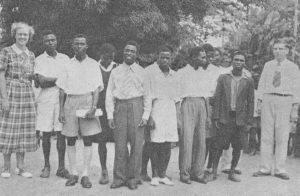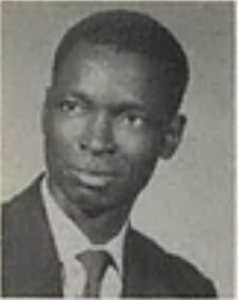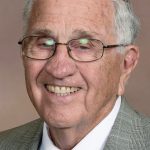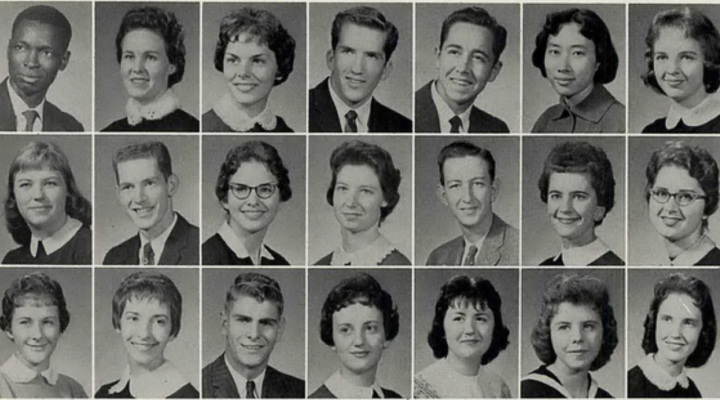He was tall, dark and handsome. As his ebony skin glistened in the sunlight, he looked like a Nigerian king.
John Lawale was introduced to Jesus by the preaching of Josephine Scaggs, a Southern Baptist missionary from Sapulpa, Okla. She saw John’s potential and with her pastoral skills guided him toward a college education in the United States.

Josephine Scaggs in Nigeria
He left his wife and six children in Nigeria and went to Waco, Texas, home of Baylor University. There he had his first contact with Baptists in America.
He was denied enrollment at Baylor since the school at that time was not integrated. School officials told him Oklahoma Baptist University in Shawnee, Okla., was integrated so he should go there.
John boarded a bus on Sunday morning and had his second encounter with Baptists in the U.S. His bus had a two-hour layover in Dallas, and he decided to attend worship at First Baptist Church, then America’s largest Southern Baptist church. With everything he owned in his suitcase, he left the bus station and headed for First Baptist Church. He was greeted by ushers who explained to him there was a Negro Baptist Church he could attend.
His third contact with U.S. Baptists came at OBU. While trying to enroll, school officials explained to John that OBU had been integrated, as the Baylor folks had explained, but that event occurred two years previously when the basketball coach, Bob Bass, had given a scholarship to a Black basketball athlete. The boy had stayed only one year and left because he was the only Black person on campus, and he was lonely. They informed John there was a Black school (Langston University) not far away and he would be happier there.
John would not be deterred, and he was enrolled.
The two of us became good friends. I grew up in an orphanage in Oklahoma City, and once you graduated from high school you were on your own. When you left, your bed was given to a younger person who needed it.
“On holidays, such as Thanksgiving or Easter, John and I would be in the dorm, almost alone.”
John’s family was far away, in Nigeria. On holidays, such as Thanksgiving or Easter, John and I would be in the dorm, almost alone — thus the developing friendship. We became such friends that John would come up to me, touch my white forearm with his black fingers and say, “Beal (his pronunciation of Bill), you are too white, God took you out of the oven too soon. He needs to re-bake you.”

John Lawale, 1960
One night John Scales, Charles Wade and I took Lawale to the Wide Awake Cafe, a popular eating establishment a couple of blocks from campus. The waitress pointed to three of us and said she could serve us, but not him (John), so we asked to speak to the manager. He came out and reiterated what the waitress had said.
We got up to leave and told the manager we would tell every student on campus about John’s being rejected there and would do our best to boycott his place of business. He quickly relented and served us pie and coffee.
On the occasion of our class’s 45th reunion, John wrote a letter that was read to the class. He cited that night at the Wide Awake as his fondest memory of OBU.
John was in the U.S. a total of five years. He finished OBU in two and a half years, went to the University of Oklahoma and two and a half years later left for Nigeria with a Ph.D. in English.
Back home, he began teaching at the Baptist University in Ogbomosho. John soon became president of the school and spent his career there influencing hundreds of young Nigerians. After retirement, John became chief of his tribe.
He has gone from among us but left a lifetime of service and good works.
We have made some progress with racism. Baylor University is now fully integrated. First Baptist Church of Dallas is open to Blacks, and OBU welcomes Black students with open arms.
We are not where we ought to be, but we have made progress.
But what about women more than 70 years after Josephine Scaggs led John Lawale to become a Christian? She likely would not be allowed to find such nuggets as John Lawale in the wilds of Nigeria today if she were Southern Baptist.
Which is it: Progression or regression?

Bill Bruster
Bill Bruster is a retired pastor of multiple Southern Baptist churches, the last of which was First Baptist Church of Abilene, Texas. He was instrumental in launching the Cooperative Baptist Fellowship and spent the latter part of his career as a field coordinator for CBF. He lives in Dallas, where he is a member of Wilshire Baptist Church and serves on the board of Gaston Christian Center.
Related articles:
Remembering the struggle to integrate even ‘progressive’ Baptist churches in the 1960s | Analysis by Alan Bean
‘I remember repeating to myself: “I have the right to be here.”’


